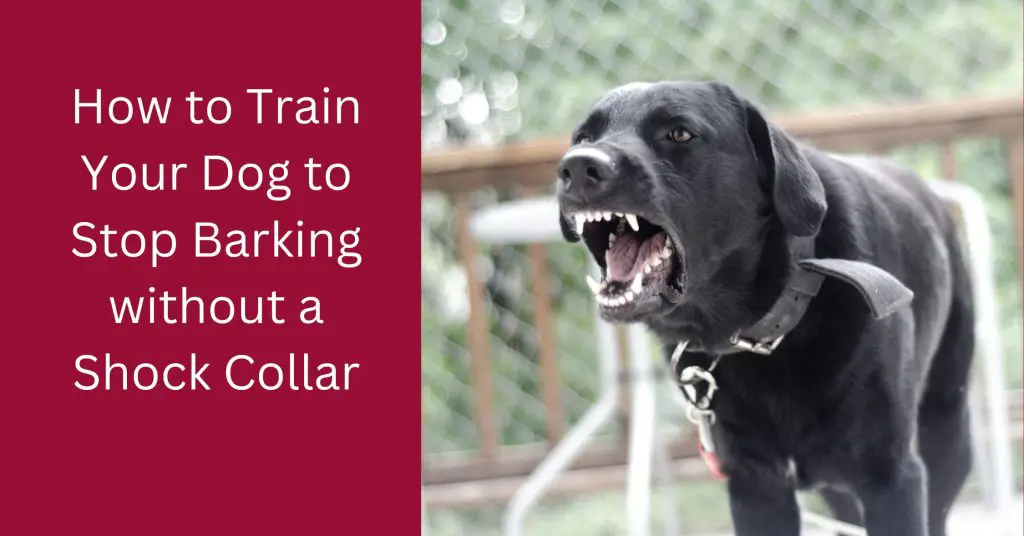
Every dog owner loves their furry companion, but excessive barking can be a nuisance. While shock collars may seem like a quick fix, they can be harmful and distressing for dogs.
Fortunately, there are humane and effective methods to train your dog to stop barking excessively.
In this article, we will explore positive training techniques that will help you communicate with your canine friend, address the root causes of their barking, and build a strong bond between you and your furry companion.
Understanding Why Dogs Bark
1. Identifying the Triggers
Before addressing your dog’s barking behavior, it’s crucial to understand why they bark in the first place. Dogs may bark due to various reasons, such as territorial instincts, fear, boredom, loneliness, or seeking attention. Identifying the triggers behind your dog’s barking will enable you to apply targeted training.
2. Using Positive Reinforcement
Positive reinforcement is a powerful training tool. When your dog behaves calmly and refrains from barking in situations that typically trigger barking, reward them with treats, praise, or affection. This will encourage your dog to associate silence with positive experiences.
Effective Training Techniques
3. Teach the “Quiet” Command
Teaching your dog the “quiet” command is essential to control their barking. When your dog starts barking, wait for a brief pause and say “quiet” in a calm but firm tone. Once they stop barking, reward them immediately. With consistent practice, your dog will learn to associate “quiet” with stopping barking.
4. Create a Distraction
Sometimes, barking occurs out of boredom or restlessness. Providing your dog with engaging toys or puzzles can help divert their attention and prevent excessive barking. Mental stimulation is equally important as physical exercise for dogs.
5. Socialize Your Dog
Proper socialization is crucial in preventing fear-based barking. Expose your dog to different environments, people, and other animals from an early age. This exposure will help build their confidence and reduce anxiety-related barking.
6. Address Separation Anxiety
If your dog barks excessively when you leave, they might be experiencing separation anxiety. Gradually accustom your dog to your departures by starting with short absences and gradually increasing the duration. Providing them with comforting items, such as a shirt with your scent, can also help.
7. Be Consistent
Consistency is key in dog training. Set clear rules and boundaries, and ensure all family members follow the same training techniques. Inconsistency may confuse your dog and hinder their progress.
The Role of Patience and Persistence
Training a dog to stop barking requires patience and persistence. Some dogs may respond quickly, while others may take more time to change their behavior. It’s essential to remain patient and avoid punishment-based training methods, as they can be counterproductive.
check These best dog collar which help to stops barking
Conclusion
Training your dog to stop barking without a shock collar is a process that requires dedication, but it’s a rewarding experience for both you and your furry friend.
Positive reinforcement, understanding the reasons behind their barking, and consistent training techniques are the keys to success.
Building a strong bond with your dog and addressing their needs will lead to a harmonious and peaceful relationship.
FAQs
Q: Can I use a shock collar just occasionally?
A: It is not recommended to use a shock collar at all, even occasionally. Positive training methods are much more effective and humane.
Q: Should I punish my dog for barking excessively?
A: No, punishment-based methods can create fear and anxiety in dogs, making the barking problem worse.
Q: How long does it take to train a dog to stop barking?
A: The time it takes to see significant improvement can vary depending on the dog’s personality and history, but consistency is key.
Q: Are some dog breeds more prone to excessive barking?
A: Yes, some breeds are more vocal by nature, but proper training can still help manage their barking behavior.
Q: Can I seek professional help if I’m struggling with training my dog?
A: Absolutely! Professional dog trainers can offer personalized guidance and support to address specific behavioral issues.
